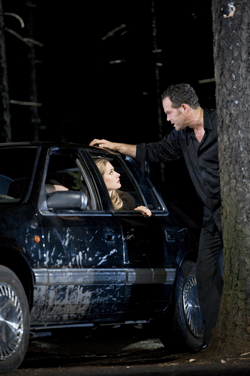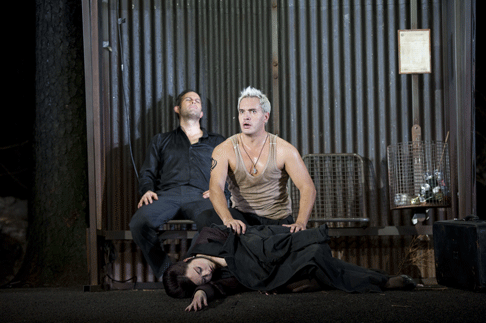![Gerald Finley as Don Giovanni [Photo © Monika Rittershaus courtesy of Salzburg Festspiele]](http://www.operatoday.com/hires-giovanni_2011_012-h.gif)
29 Aug 2011
Don Giovanni, Salzburg
When discussing the evolution of opera as a genre, the towering figure of Richard Wagner cannot be ignored.
English Touring Opera are delighted to announce a season of lyric monodramas to tour nationally from October to December. The season features music for solo singer and piano by Argento, Britten, Tippett and Shostakovich with a bold and inventive approach to making opera during social distancing.
This tenth of ten Live from London concerts was in fact a recorded live performance from California. It was no less enjoyable for that, and it was also uplifting to learn that this wasn’t in fact the ‘last’ LfL event that we will be able to enjoy, courtesy of VOCES8 and their fellow vocal ensembles (more below …).
Ever since Wigmore Hall announced their superb series of autumn concerts, all streamed live and available free of charge, I’d been looking forward to this song recital by Ian Bostridge and Imogen Cooper.
Although Stile Antico’s programme article for their Live from London recital introduced their selection from the many treasures of the English Renaissance in the context of the theological debates and upheavals of the Tudor and Elizabethan years, their performance was more evocative of private chamber music than of public liturgy.
Evidently, face masks don’t stifle appreciative “Bravo!”s. And, reducing audience numbers doesn’t lower the volume of such acclamations. For, the audience at Wigmore Hall gave soprano Elizabeth Llewellyn and pianist Simon Lepper a greatly deserved warm reception and hearty response following this lunchtime recital of late-Romantic song.
For this week’s Live from London vocal recital we moved from the home of VOCES8, St Anne and St Agnes in the City of London, to Kings Place, where The Sixteen - who have been associate artists at the venue for some time - presented a programme of music and words bound together by the theme of ‘reflection’.
'Such is your divine Disposation that both you excellently understand, and royally entertaine the Exercise of Musicke.’
‘And there was war in heaven: Michael and his angels fought against the dragon; and the dragon fought and his angels, And prevailed not; neither was their place found any more in heaven … that old serpent … Satan, which deceiveth the whole world: he was cast out into the earth, and his angels were cast out with him.’
There was never any doubt that the fifth of the twelve Met Stars Live in Concert broadcasts was going to be a palpably intense and vivid event, as well as a musically stunning and theatrically enervating experience.
‘Love’ was the theme for this Live from London performance by Apollo5. Given the complexity and diversity of that human emotion, and Apollo5’s reputation for versatility and diverse repertoire, ranging from Renaissance choral music to jazz, from contemporary classical works to popular song, it was no surprise that their programme spanned 500 years and several musical styles.
The Academy of St Martin in the Fields have titled their autumn series of eight concerts - which are taking place at 5pm and 7.30pm on two Saturdays each month at their home venue in Trafalgar Square, and being filmed for streaming the following Thursday - ‘re:connect’.
The London Symphony Orchestra opened their Autumn 2020 season with a homage to Oliver Knussen, who died at the age of 66 in July 2018. The programme traced a national musical lineage through the twentieth century, from Britten to Knussen, on to Mark-Anthony Turnage, and entwining the LSO and Rattle too.
With the Live from London digital vocal festival entering the second half of the series, the festival’s host, VOCES8, returned to their home at St Annes and St Agnes in the City of London to present a sequence of ‘Choral Dances’ - vocal music inspired by dance, embracing diverse genres from the Renaissance madrigal to swing jazz.
Just a few unison string wriggles from the opening of Mozart’s overture to Le nozze di Figaro are enough to make any opera-lover perch on the edge of their seat, in excited anticipation of the drama in music to come, so there could be no other curtain-raiser for this Gala Concert at the Royal Opera House, the latest instalment from ‘their House’ to ‘our houses’.
"Before the ending of the day, creator of all things, we pray that, with your accustomed mercy, you may watch over us."
The doors at The Metropolitan Opera will not open to live audiences until 2021 at the earliest, and the likelihood of normal operatic life resuming in cities around the world looks but a distant dream at present. But, while we may not be invited from our homes into the opera house for some time yet, with its free daily screenings of past productions and its pay-per-view Met Stars Live in Concert series, the Met continues to bring opera into our homes.
Music-making at this year’s Grange Festival Opera may have fallen silent in June and July, but the country house and extensive grounds of The Grange provided an ideal setting for a weekend of twelve specially conceived ‘promenade’ performances encompassing music and dance.
There’s a “slide of harmony” and “all the bones leave your body at that moment and you collapse to the floor, it’s so extraordinary.”
“Music for a while, shall all your cares beguile.”
The hum of bees rising from myriad scented blooms; gentle strains of birdsong; the cheerful chatter of picnickers beside a still lake; decorous thwacks of leather on willow; song and music floating through the warm evening air.
![Gerald Finley as Don Giovanni [Photo © Monika Rittershaus courtesy of Salzburg Festspiele]](http://www.operatoday.com/hires-giovanni_2011_012-h.gif)
When discussing the evolution of opera as a genre, the towering figure of Richard Wagner cannot be ignored.
His radical conception of the connection between opera and philosophy is seen all throughout his work; this is especially clear in his four part Ring cycle. In the popular imagination, the Ring cycle has become the most recognizable multi-part operatic work. This is why this year’s Salzburg Festival’s presentation of all three of Mozart’s Da Ponte operas as a continuous trilogy is eyebrow-raising. Although it may seem strange on paper, Claus Guth’s choice to present these operas (Le nozze di Figaro, Don Giovanni, and Così fan tutte) as a continuous statement on the dark side of human nature makes sense. However, during the transition from creative concept to stageds production, something went awry. As a result, this production was a potpourri of fleeting inspirations.
Guth’s conception of the trilogy is to be commended for stagings of reasonable merit. His production of Così fan tutte used elements from both Figaro and Don Giovanni to present the libretto as if it were a social experiment gone wrong. His stage pictures illustrated the deteriorating relationships between the characters as well as the evil inherent in Don Alfonso’s scheme. On the whole, this gave refreshing depth to Così. The problem however, is Guth’s staging of Don Giovanni only hints at its place in the trilogy as a bridge between the mostly safe world of Figaro to the tumultuous world of Così.
 Malin Byström as Donna Anna and Gerald Finley as Don Giovanni
Malin Byström as Donna Anna and Gerald Finley as Don Giovanni
Don Giovanni occupies a unique place in the Da Ponte trilogy. Unlike Figaro where the potential for evil is never fully in the foreground, Giovanni is evil personified. While ultimately, Giovanni is vanquished by death, the characters of Così are forced to confront their own imperfections. If Guth wanted to view the three operas as an evil trilogy, this is the direction he should have taken. Instead, he took liberties with the libretto of Don Giovanni that ultimately caused some confusion with character development as well as with the progression of the drama.
As Giovanni, Gerald Finley gave a searing performance which carries on the mantle of Sir Thomas Allen. What would have been an otherwise electric performance, was hindered by Guth’s decision to have Giovanni “fatally” wounded at the outset; limiting his ability to inhabit the strong body of the slimy villain . This gives rise to another more unfortunate question: if Don Giovanni is so near death, what makes him a force to be reckoned with? This also left me with mixed emotions regarding the character. Take for example, “Fin ch’han dal vino”, whereby Finley poured a can of beer over himself and then proceeded to shake like a ferocious wet dog. This was scary to watch. Needless to say, his singing enhanced his actions. Yet at the end of the aria, he collapsed to the floor. The message here is unclear. It would have been better if he ended the aria with the typical maniacal laugh.
As Donna Anna, Malin Byström sang in the big-voiced tradition of Sharon Sweet. The most interesting facet of her performance was her rendition of “Or sai chi l’onore”. Here Donna Anna became someone who was exposed and vulnerable due to the murder of her father, as opposed to the more typical strong woman who screams at her fiancé in order to avenge this death. However, in this production, Donna Anna played into another flaw: Giovanni’s attempted rape of Donna Anna which normally begins the opera was portrayed as a consensual affair. Under this circumstance the whole rasion d’etre of the rage of Donna Anna and the villainy of Giovanni remain unsubstantiated. Despite the opera’s tragic elements, this is still an opera buffa. A key feature of opera buffa is the unflattering portrayal of the aristocracy. In this production, the aristocracy, which is symbolized by Don Giovanni, does not experience the ridicule to the same degree as there is a deficiency of the villainy Don Giovanni.
 Gerald Finley as Don Giovanni, Dorothea Röschmann as Donna Elvira and Erwin Schrott as Leporello
Gerald Finley as Don Giovanni, Dorothea Röschmann as Donna Elvira and Erwin Schrott as Leporello
Dorothea Röschmann, as Donna Elvira, sang powerfully, giving an excellent case for Donna Elvira as a tragic heroine, which was strengthened in synergy by Byström’s portrayal of Donna Anna as a weak character. Christiane Karg was a girlish Zerlina who could also show great concern and substantial depth of character as necessary. Adam Plachetka, as Masetto, made it clear that he understood the evil Giovanni from the very beginning. Both Don Ottavio and Leporello, played by Joel Priesto and Adrian Sâmpetrean, respectively were admirably sung.
Under the direction of Yannick Nézet-Séguin, the Vienna Philharmonic made a fine case for the symphonic capabilities of Mozart’s score. However, his tempos were slow at the beginning, and the numerous florid accompaniments to the recitatives were distracting. That said, he brought a romantic expansiveness to certain pieces, including “Là ci darem la mano”.
It remains to be said that some of the humor of the production diminished the overall dramatic effect. The humor of Mozart’s tragic comedy should arise from situations that are detailed in the libretto, not from the staging. There were several instances, such as Giovanni taunting Zerlina and Masetto while on a swing, that were humorous, while at the same time illustrating the Don’s capacity for villainy. Yet, other gags consisted of elaborate stage movements that were difficult to follow and at times disrupted the flow of the drama. The imbalance produced by these attempts at comedy was symbolic of the overall effect of Guth’s production. In this adaptation, there were moments of inspiration that were somehow lost.
Gregory Moomjy